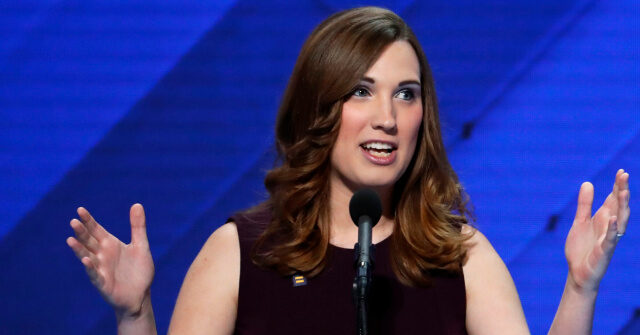The topic of transgender rights, particularly regarding bathroom access for transgender lawmakers, has ignited a heated debate in American society. A recent survey conducted by the Economist/YouGov reveals that a majority of Americans believe transgender members of Congress should utilize bathrooms aligned with their biological sex at birth. This perspective aligns with a measure proposed by Rep. Nancy Mace (R-SC), which seeks to restrict members of the House from using single-sex facilities that do not correspond to their assigned sex. This legislation comes in response to the election of Sarah McBride, a transgender individual, to the House of Representatives, highlighting an ongoing tension surrounding the rights and treatment of transgender people in public spaces.
The survey findings are compelling, with 51 percent of respondents indicating that transgender lawmakers should use bathrooms based on their sex assigned at birth. In contrast, only 19 percent support the idea that these individuals should use facilities corresponding to their current gender identity. Additionally, a notable generational divide is evident, as only 37 percent of younger individuals aged 18-29 favor restrictive bathroom measures based on biological sex, while larger majorities within older age brackets share that view. These results suggest that public opinion on transgender rights is complex and varies across different demographics, including age and political affiliation.
The political affiliations of respondents also reveal stark contrasts in perspectives. Among Republicans, a significant 77 percent agree with Mace’s proposed measure, while 50 percent of independents share this viewpoint. Conversely, Democratic opinions are more mixed, with 27 percent advocating for restrictions based on biological sex and 34 percent endorsing the use of bathrooms aligned with current gender identity. The diversity of responses highlights the polarized nature of the discussion, particularly amid an atmosphere where both proponents and opponents of transgender rights are vocal in their beliefs.
As debates intensify, both supporters and critics of Mace’s measure have taken strong stances. Rep. Mace argues that allowing transgender individuals to use bathrooms corresponding to their gender identity compromises the safety and dignity of women, emphasizing her determination to protect single-sex spaces. On the contrary, Rep. Alexandria Ocasio-Cortez (D-NY) vehemently opposes the measure, asserting that it puts women and girls at greater risk of harm by suggesting that their privacy and safety may be undermined by such policies. Ocasio-Cortez’s passionate critique illustrates the broader societal fears and misconceptions surrounding the implications of allowing transgender individuals access to facilities according to their identity.
Mace’s commitment to defending her stance is unwavering, as she has publicly declared that she is willing to “die on this hill” for the cause she believes in. Her remarks resonate with a segment of the population that values traditional definitions of gender and sex. Conversely, Ocasio-Cortez’s assertions reflect a deep concern for the potential social consequences of Mace’s policies and underline the ongoing anxiety over gender, safety, and the treatment of marginalized communities. Each political figure’s rhetoric amplifies the underlying tension in U.S. society regarding access to public facilities and the evolving understanding of gender identity.
In conclusion, the transgender bathroom debate highlights a fundamental clash of values and beliefs in contemporary America, revealing a landscape marked by significant divergence in public opinion. While many individuals adhere to a perspective rooted in biological determinism, a growing number advocate for the rights of transgender individuals to live authentically, free from discrimination in public spaces. As legislative battles unfold and public sentiment continues to shift, the dialogue surrounding transgender rights and access to facilities will undoubtedly play a pivotal role in shaping future policies and societal norms. Such discussions underscore the importance of civil discourse and understanding as society grapples with evolving definitions of gender, identity, and inclusion.

